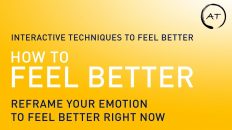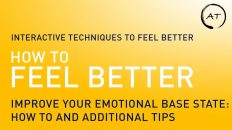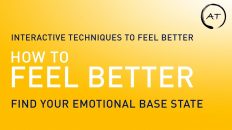We all have goals. We all want to do something amazing or become someone great. But we also carry significant emotional baggage that makes achieving what we want to more difficult or impossible than it should be. Whether you want to get in great shape or advance your career, residual negative emotions make getting what you want seem further off than it really is.
Can you imagine how effective you would be if everything you did felt easy?
How easy would getting in shape be if you enjoyed going to the gym and eating healthy? How much would your career trajectory improve if you enjoyed working late on something important?
Whatever you want to do, whatever you think you should do, can be easy. Through emotional understanding, you can stop simply wanting to achieve things and begin working to bring them into your life.
Emotional understanding makes achieving goals feel natural and effortless. All you need to do is examine why you think a goal is difficult or unpleasant and release your negativity around it.
I do this for every goal I have, from writing a book to feeling confident at large speaking events. Once I release the emotions that tell me I don’t want to or won’t be able to, achieving my goals feels like biking down a light hill. Most of the time, the feeling of “hard work” is really disguised emotional resistance.
Ultimately, how easy or hard achieving your goal will feel is determined by your emotional blockers around the goal. For instance, if my goal is to climb Mt. Everest, but I’m scared of heights, my fear of heights is one of my emotional blockers.
Generally, there are 3 types of emotional blockers around achieving a goal:
- Immediate blockers: the things you dislike about the actual doing of the goal.
- Identity blockers: the things about yourself that tell you that you aren’t the type of person who would achieve the goal.
- Receiving blockers: the beliefs you have that prevent you from letting yourself achieve the goal.
Immediate Blockers – The Things You Don’t Like About Doing Your Goal
By far the most obvious emotional resistances to achieving your goal are your immediate blockers. These are the things you dislike doing about the goal. So with our Mt. Everest example, I might make the following immediate blocker list:
- I hate the cold.
- I’m scared of heights.
- My wrist hurts when I rock climb.
- I don’t know if I need a visa to get to Mt. Everest.
- I don’t want to climb Mt. Everest alone.
Each of these immediate blockers has past emotional resistance behind it. They aren’t just physical problems, despite their appearance. They all have solutions both physical and emotional.
So before I even being my training, I will examine each blocker to figure out what emotions are holding me back and how best to proceed. You could imagine my fear of heights coming from a childhood fall. My wrist concern may require me gaining confidence and strengthening my wrist. Not knowing about the visa may come from fear of the unknown or failing to solve a logistics problem when I was younger.
Each cause can be more fully understood, and I can accept the limitations and conditions around my goal. The second I stop hating the cold and just accept it, I will have a much better experience.
Identity Blockers – The Things that Sap Your Strength and Motivation
Identity Blockers are often the things that keep us from getting started. They tell us that our goal is not possible for us or that we are not good enough to achieve the goal. They are much more subtle than immediate blockers, but just as important to address.
If right now I can’t run a mile, but I dream of climbing Mt. Everest, I may not think that I am a fitness guy. Because I feel like a couch potato, and couch potatoes simply do not climb Mt. Everest, I’m demotivated to even start.
But if I truly dream of the climb, I will need to examine why I think I’m a couch potato and reframe how I view myself. These identity problems come up often. For instance, if you are the youngest child, you may not feel like you are someone who takes responsibility for things. But there is nothing stopping you from taking responsibility at work to get promotion, except your identity blocker.
Identity blockers sap strength and motivation. They falsely tell you that you cannot be or do what you want. You can. No matter what other people tell you, if you really want to do something, I believe in you. And I think you should believe in you too. So look at your identity and the negative voices in your past. Determine the origin of your limiting beliefs. Root them out, feel better, and be the person you want to be.
Receiving Blockers – Deserving and Accepting
Slightly different than Identity Blockers, Receiving Blockers are beliefs that limit the flow of good things to you. The most common one you see is not accepting help/support. Some people take self-reliance too seriously or have to much pride to accept help. Personally, I used to err on the side of doing everything myself. And I still will refuse help if I believe that I must do something on my own in order to grow. But now, when people offer help and seem like they genuinely want to give, I accept their support. Giving is very important for people. It makes them happy. I never seek out help to the detriment of others, but I do accept when people want to give me a small hand here and there.
Other times, people will not receive what they want because they do not feel worthy. Think of your shy friend who does not accept that they are great company. They may only have difficulty making new friends because they do not believe how great they really are. These feelings of undeservingness or inadequacy can prevent you from achieving the goals that are in your grasp.
When I first started lifting weights to get healthy, I noticed this first hand. Occasionally, on my last rep, I would fail. This wasn’t because I couldn’t do it, but because mentally, I did not feel like I should be able to. I had to open my mind to receive my own strength.
Try to see why you may not accept achieving your goal.
Once you have examined your Immediate, Identity, and Receiving Blockers, your real work begins. But, this time, it won’t feel like work at all. Without the negative emotions holding you back, you will achieve anything you put your mind to doing.


